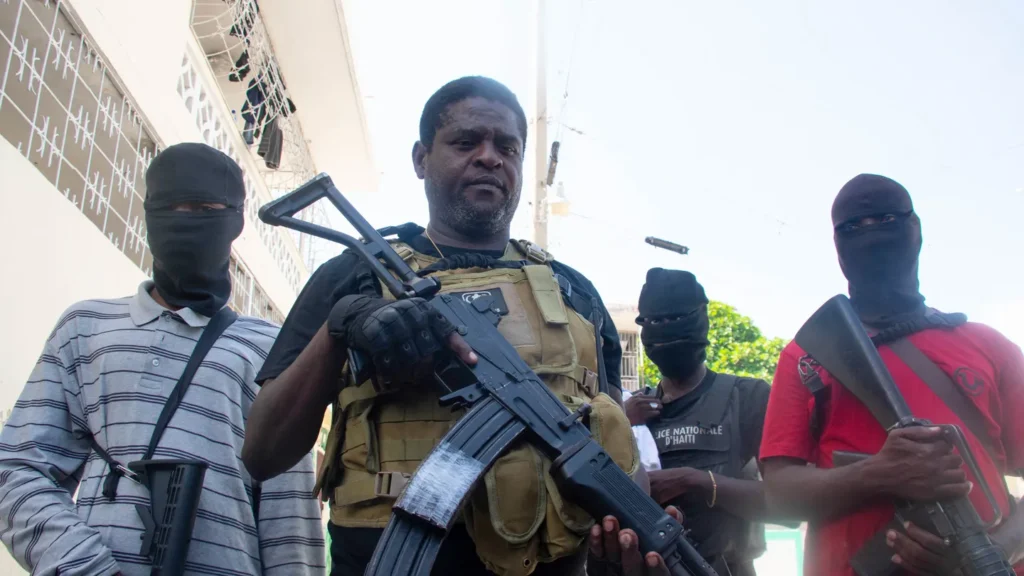Haitian street gangs have for years plunged the Caribbean nation into an unending political and humanitarian crisis, with gang leaders suspected of ties to the 2021 Haitian president’s assassination now controlling key national infrastructure.
The gangs have frequently launched attacks on police stations and prisons, resulting in the release of thousands of inmates. Additionally, they have engaged in various acts of lawlessness that have paralyzed Port-au-Prince, the capital city.
-
Sale!
Download Nairobi Law Monthly Magazine July 2024 Edition
Downloads Original price was: KShs200.00.KShs100.00Current price is: KShs100.00.
Now, in recent times, some of the gangs have begun portraying themselves as paramilitary forces, wielding more sophisticated weapons than the police, as they become ‘stronger, richer, and more autonomous’ due to arms trafficking, according to the United Nations.
The UN Office on Drugs and Crime (UNODC) states in its latest report on the illegal arms trade in Haiti that there has been a “surge in the trafficking of increasingly high-powered and sophisticated weapons since 2021, mostly linked to gang-related activities.”
According to the UN panel of experts that monitors sanctions imposed by the Security Council on Haiti in 2022, these “deadly arsenals,” mainly trafficked from the US, mean that gangs have “firepower that exceeds that of the Haitian National Police”.
“The problem is that as more weapons get in, the more gangs expand their control over strategic points such as ports and roads, making it even more difficult for authorities to prevent arms trafficking,” says UNODC’s regional representative, Sylvie Bertrand.
An estimated 150 to 200 gangs now operate across Haiti, with about 23 operating in Port-au-Prince. The city gangs are split into two groups: G-Pèp, led by Gabriel Jean Pierre, aka Ti Gabriel, and the G9 Family and Allies, led by Jimmy Chérizier, also known as Barbecue.
- Haiti gangs try to take over Port-au-Prince airport
- High Court bars State from deploying Kenyan police to Haiti
- US poised to designate Kenya as major non-NATO ally
Recently, the two rivals have joined forces in coordinated attacks, targeting key locations including the airport, hospitals, schools, police stations, customs offices, and ports.
They have also aimed their attacks at significant landmarks such as the National Palace and the National Theatre, effectively imposing their will and expanding their territory.
The growing influence and capacity of the Haitian gangs poses a real threat to the Kenyan-led multinational police force expected to be deployed soon to contain the lawlessness.
Security experts have warned that the 2,500 Kenyan police officers who are expected to start arriving in Haiti this week, will face a more equipped, funded, trained, and unified criminal gang than any previous mission deployed to the country.
Indeed, Chérizier has cautioned the Kenyan officers against setting foot into Haiti, warning that his group will fight tooth and nail to wipe out the officers.
Kenyan officials have, however, dismissed the braggadocio, saying the officers – drawn from the Recce Squad, Rapid Deployment Force and Special Operation Group – are well conversant with dealing with violent crimes like those being witnessed in Haiti.
Most of these officers have been involved in fighting Al Shabaab militants in the North Eastern region. They have been trained in the US ahead of the deployment.
President William Ruto has pledged Kenya’s support for the UN-backed multinational mission to restore order in Haiti, despite a court ruling against the deployment.
“Kenya stands ready and willing— in concert with a broad alliance of nations in Africa and the Caribbean Community— committed to Haiti’s stability,” Dr Ruto said on X last month.
In January, High Court Judge Chacha Mwita ruled that the decision to deploy police officers to Haiti was unconstitutional, as it contravened the Constitution and the law.
Based on this ruling, city lawyer Ekuru Aukot filed an application in court on Friday asking that the Kenyan government be held in contempt over plans to send 200 police officers to the Caribbean nation this week.


